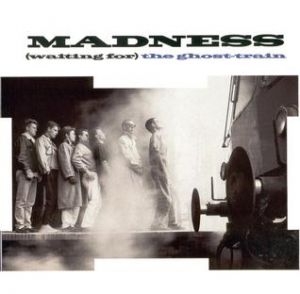(Waiting For) The Ghost Train by Madness (1984)
(Waiting For) The Ghost-Train is a single released in 1986 by Madness, shortly after they announced their split. The song peaked at number 18 in the UK charts. (Waiting For) The Ghost-Train appeared on the band’s album in 1986, Utter Madness.
Key Lyrics
A straw headed woman, and a barrel chested man,
A pocket full of posies with a hat brim full of sand,
Ooh - waiting for the train that never comes,
A dog chasing the tumbleweeds, across the sandy floor,
That drift along the platform, through the ticket office door,
Ooh - waiting for the train that never comes,
Ooh - waiting for the train that never comes,
But don't tell me there's nothing coming, you don't fool me,
I hear the ghost train rumbling along the tracks - set them free,
And I hear them,
It's black and white don't try to hide , It's black and white don't try to hide,
The station master's writing with a piece of orange chalk,
A hundred cancellations, still no one wants to walk,
Keep the hungry children from the skeletons in the back,
Paid to keep an eye out for the gipsy caravan,
Ooh - waiting for the train that never comes,
Ooh - waiting for the train that never comes, [1]
Controversy
The song tells about apartheid in South Africa, written by Suggs, with the song’s chorus "It's black and white, don't try to hide it" and the line "The station master's writing with a piece of orange chalk / One hundred cancellations, still no one wants to walk," [2] which signifying the seperation between black and white communities, as well as the tension between the two communities that they blamed on each other over the segregation either in public facilities, social events, or employment opportunities by race. The apartheid itself happened in 1948 until the early 1990s where racial segregation existed between South Africa and South West Africa (Namimbia) where the political culture was based on white supremacy, which South Africa was dominated by the White population, politically, economically, and socially. The system applied stratification where White people had the highest status than Black Africans. The economic legacy and social effects of apartheid still continue to the present day. [3] [4]
References
- ↑ (waiting for) The Ghost Train Madness. vagalume.com. Retrieved January 24, 2021
- ↑ (Waiting For) The Ghost Train. wikipedia.org. Retrieved January 24, 2021
- ↑ Apartheid. wikipedia.org. Retreived February 6, 2021
- ↑ Madness – (Waiting For) The Ghost Train. songmeanings.com. Retrieved February 6, 2021

